Tenor Ryland Davies
A Conversation with Bruce Duffie
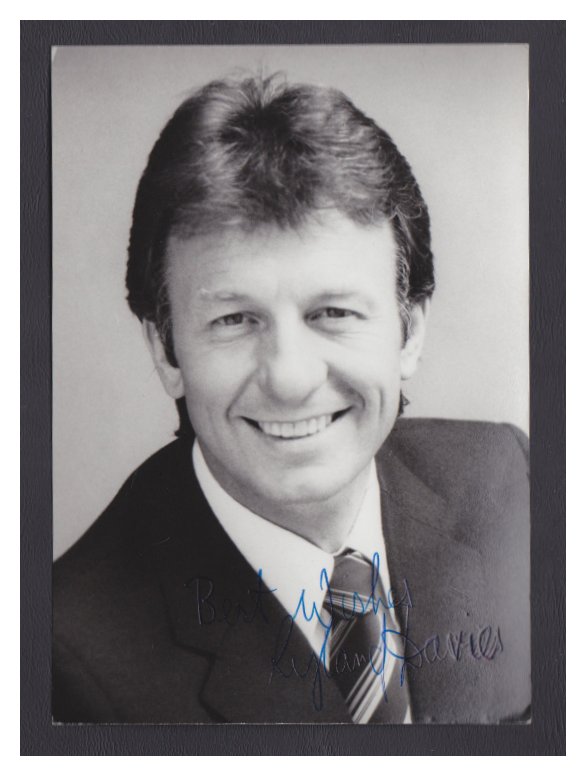
Ryland Davies – Tenor – studied
at the Royal Manchester College of Music with Frederic Cox, who
remained a lifelong friend. On the recommendation of Luciano Pavarotti
he continued his studies in Italy with Ettore Campogalliani and Luigi
Ricci. He made his operatic debut singing Rossini's Count Almaviva in
1964 at Welsh National Opera. Since then he has performed in all the
major opera houses singing the leading lyric tenor roles such as
Belmonte, Don Ottavio, Ernesto, Fenton, Ferrando, Flamand, Lysander,
Lenski, Nemorino and Tamino.
Ryland has sung and recorded with many leading orchestras and
conductors such as Daniel
Barenboim, Sir Colin Davis, Sir John Eliot Gardiner,
Carlo Maria Giulini, Herbert von Karajan, Kirill Kondrashin, Sir Simon
Rattle and Mstislav Rostropovich. He has
taught at the Royal Northern College of Music and the Royal College of
Music and is currently Professor of Singing at the Royal Academy of
Music. He has given master classes in the UK and all over the world,
including Amsterdam, Chicago, Houston and Glyndebourne Touring Opera.
After nearly fifty years since his debut as a lyric tenor, Ryland
continues to be in demand to sing many character roles.
-- Names which are links refer to my
interviews elsewhere on this website. BD
|
At some point in their careers, many singers also embrace
teaching. Often this happens after retirement from the stage, but
some begin during their performing days. After many years as a
leading Mozart tenor, Ryland Davies has established himself as a fine
teacher of voices, and at the same time continues to appear all over
the world, now in supporting roles.
Here in Chicago, we have enjoyed all these sides of his artistry.
In 1972, he appeared as Ferrando in Così
fan tutte along with Margaret Price, Tom Krause, Anne Howells,
Urszula Koszut, and Geraint Evans, in the Ponnelle production conducted
by Dohnányi. He would return in 1998 for Don Basilio in Marriage of Figaro with
Renée Fleming, Bryn Terfel, Elizabeth Futral, Håken
Hagegård, Susan
Graham, and Dale Travis, led by Zubin
Mehta. He would also give master classes for the Lyric Opera
Center for American Artists (as it was called then), and return for the
Opening Night Figaro in 2003.
We met between performances in March of 1998, and the encounter was
filled with both serious ideas and humorous asides.
In most of my transcriptions, I use the initials of both my guest and
myself to indicate who is speaking. However, since RD and BD look
very much alike, I wanted to avoid any confusion and thus have utilized
Ryland.
Here is that conversation . . . . . . .
Bruce Duffie: Tell
me the secret of singing Mozart!
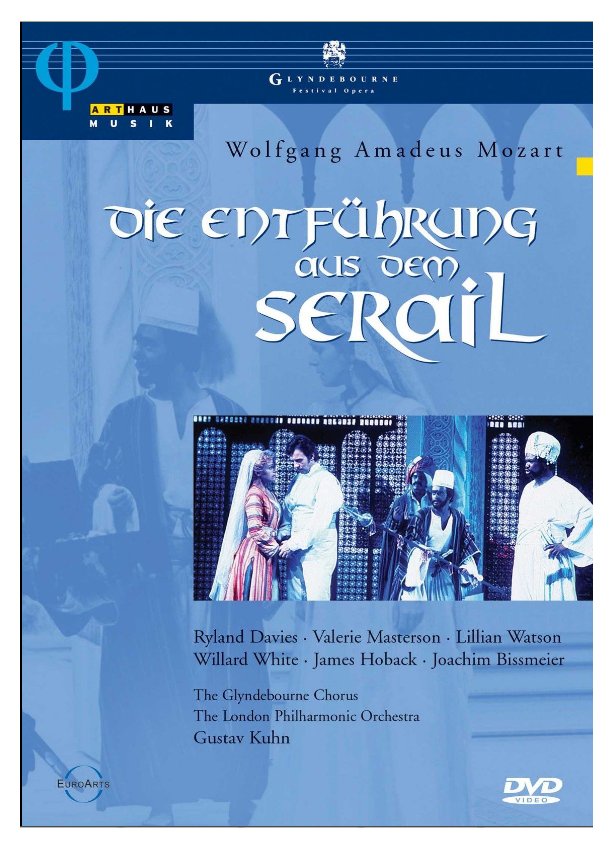 Ryland Davies: Tell
me the secret of singing
anything! Singing Mozart? The secret is the technique for
the singer must be pretty well set up because he’s the most exposing of
composers. It looks so simple on the page, as singers will tell
you, but that simplicity demands a purity of line and a very poised
technique. I don’t mind going on record as saying that. My
teacher, Frederick R. Cox, was somewhat criticized in Manchester, back
in the 50s, 60s and
70s when he was the Principal for not doing hardly any Mozart!
His belief was that it was for more matured and poised technique.
We were given Mozart arias to sing for concerts and things like that,
but he felt to sustain a major
Mozart role, unless they were
particularly gifted and the technique was really advanced, that it
would inhibit students. I never heard him say this, but I
gathered
this over the years. It could inhibit because it demands
such control.
Ryland Davies: Tell
me the secret of singing
anything! Singing Mozart? The secret is the technique for
the singer must be pretty well set up because he’s the most exposing of
composers. It looks so simple on the page, as singers will tell
you, but that simplicity demands a purity of line and a very poised
technique. I don’t mind going on record as saying that. My
teacher, Frederick R. Cox, was somewhat criticized in Manchester, back
in the 50s, 60s and
70s when he was the Principal for not doing hardly any Mozart!
His belief was that it was for more matured and poised technique.
We were given Mozart arias to sing for concerts and things like that,
but he felt to sustain a major
Mozart role, unless they were
particularly gifted and the technique was really advanced, that it
would inhibit students. I never heard him say this, but I
gathered
this over the years. It could inhibit because it demands
such control.
BD: It isn’t
something you should start getting into
your throat when you’re very young, so that when you have a maturity
you understand it?
Ryland: Well,
that is something else. There you’re
talking about life and the style of Mozart. But if you’re
going to touch it at all, you’ve got to sing it to get into your
throat. I know a lot of colleges use it because it doesn’t have
big
orchestration for them to have to compete with. That’s all very
valid, and very often a lot of people find that it does develop the
voice, but I brought that in because you asked me about it.
In my own case, I started singing Mozart quite young because my
career started young, although I didn’t do a Mozart role at
Manchester. I did Rossini and Gluck, and one or two other
things as a student.
BD: But you
had that type of voice?
Ryland: I had
that type of voice, yes.
BD: It takes
that type of voice to sing
Mozart at some point?
Ryland:
Yes. I had the right weight and size and timbre
of voice. It’s very much been the main composer in my life,
I would say, in terms of my own commercial career and earnings,
etc.
BD: Does that
please you?
Ryland: It
does please me because there is no question the
man was extraordinary.
BD: Your
voice range and weight dictate
which roles you sing. Were you pleased with those characters that
were imposed upon you?
Ryland: I was
pleased. Naturally, having been brought
up like most singers with the Italian opera ever at one’s elbow, I
would love to have had the weight and fatness of voice to have accepted
many Bohèmes and Butterflys that were offered to me
in my
first four years in the business. Because the voice was of an
Italianate ring and technique, and gave the impression
— certainly at close quarters, and even to some very
well-known
conductors that we both know — I had to say no
to because at
twenty-three and twenty-four I didn’t feel I had the range for Rodolfo
at
that time. I didn’t believe I had the C and D and enough strength
in my
B-flats. But also I didn’t believe I had the
fatness to sing against a Puccini orchestra when the tunes come,
because very often the whole string section’s playing along.
BD: That
takes great maturity on the part
of a twenty-three or twenty-four-year-old to say no!
Ryland:
Yes! In fact I was offered my
debut in London only a year or so after my début in
Cardiff, as Almaviva in Barber of
Seville. I did very
well in London, and then ‘they had me
in’, as they say. The management, as I remember, said, “We’d
like to offer you a permanent two or three-year contract.”
I can’t
remember now, and to be absolutely honest I was of course flattered,
and went all hot and cold. I hadn’t expected for this to happen
so
soon. But I had noticed how that particular company — Sadlers
Wells at the time, now English National Opera — some
people went through there and really survived being part of a
company. I forget what ages some of those would be, and they
survived
very well. But they were probably strong-minded too and, should I
say, fought when they had to, not to be pushed into things that really
were not sensible to sing whilst they were singing perhaps their true métier. For example,
for someone who was
singing beautifully Susanna, they would be twisting her arm to try
Mimì for a few performances on tour out in the sticks!
Well it’s up to the singer, as I
said in a master class here last week with the Young Artists Program
— in which I had a lovely time. One of the first
things to do, as soon as possible, is to get to know yourself.
Believe it or not, after thirty-four years I’m still learning
about my singing-self and my psyche and my whole philosophy about
performing.
BD: I would
have assumed that as you grow mentally
you grow physically in the throat and you grow emotionally, too.
Ryland:
Absolutely. It’s all part of that journey
that a singer takes, or a person, first and foremost, takes in
something called ‘life’.
BD: So then
it’s a constant re-evaluation?
Ryland: It is
a constant re-evaluation. If you’re sincere
and honest, and being hyper-modest and wanting to sound that way it’s
an on-going enjoyable slog! That was said to me once by Maestro
Jani Strasser, who was Head of Music
at Glyndebourne for a long time — right
through my early days
when I was asked to do Werther
and one or two other pieces that were practically out of my fach. Although
the first and fourth act of Werther
are perfect for my voice, acts two and
three need a full lyric, at least a Rodolfo, if not a bit
more actually. At times it is almost Wagnerian.
BD: It has
such a luscious orchestration.
Ryland: Yes,
the orchestration is like Debussy, at times like Pelléas. I’ve sung
that a lot. But Strasser said to me, “Go
with my blessing, but be prepared
if you have a success. The next thing they’ll ask you will be
more difficult and more out of your métier.
Also be sure that you sing
it honestly so that you can turn around and come back, and not damage
your
true Mozart and Rossini voice. Do not to muck it up!”
BD: Is it
right for the management of
these companies to always ask singers to do things that are a little
beyond them, or do they not understand the voices in the throats?
Ryland: Now,
Bruce, that is a big question! [Both laugh] Let me just
chew on that for
a minute. I’ve been around for thirty-four years next month
professionally, so I’ve gone through various parts of
the world and the reins of certain managements. Generally
speaking,
God bless them, they seem to get most of the casting right, otherwise
they’d be out of business. Of course there are
sometimes mistakes, and sometimes a bona fide singer that they know
well can hit a rough patch and they think, “He
can’t do this at the moment. Is he past it?”
The worst
thing is that they’ll write somebody off. It can happen.
Much more-known
singers than my dear little self have hit bad patches where they think
they’re going to go crazy for a year. Dame Kiri
won’t mind me saying this that she told me. There was one season
she had to
have her husband in the wings for about ten months because she just
felt she needed that sort of support that he was giving her. It
had to be somebody
very close to her, and she didn’t even want to see a teacher or a
coach. She just wanted him to stand with her while she went
through something. I never got further than that about what it
was, but it’s
not funny when these things happen. I’m sure in her case it was
not that she was singing the wrong repertoire,
because it wasn’t just one role. It was a whole season that she
felt like this. Then she worked through it. These things
happen. I’m jealous about
it, but my teacher had the pleasure of being in Milan studying for
about eight or
nine years, just before the Second World War, when there was quite a
fantastic array of people there... Pertile, Gobbi, Schipa, and
people
like that. Before that period, perhaps in the 20s and the turn of
the century,
women who sounded quite light by today’s sopranos and mezzos would sing
Norina in Pasquale one night,
and two
nights later Traviata or
something even
heavier. But they seemed to be able to do it. I don’t think
this fach categorization,
this pigeon-holing people then, was quite so
marked as it is today.
BD: Was the
Maestro keeping the orchestra down enough back then?
Ryland:
Exactly, if you had de Sabata, who I believe was
Karajan’s mentor for the Italian repertoire, or Tullio Serafin, my
Godfathers. Look what
he did with Callas! I witnessed it
with Karajan because I was fortunate to be Mirella Freni’s first Cassio
in
1970, ’71 and ’72.
I heard on the
grapevine people were saying this is too soon. She’s going to
ruin
herself. Mind you, she’d been singing Bohème for a while
by then, which, in some ways, was probably more
orchestrally heavier for her than lots of the Otello, although it’s
quite big at times, especially in Acts two and three.
But with Karajan in the pit, having decided that she’s ready
to do it, it worked. Believe me, she came out of it very, very
well. For some people’s taste it was a bit early in her career to
take on Desdemona, perhaps histrionically and
dramatically, I
don’t know, but she did a beautiful job. I did
Pelléas myself with my tenor voice. It is very often cast
as a baritone.
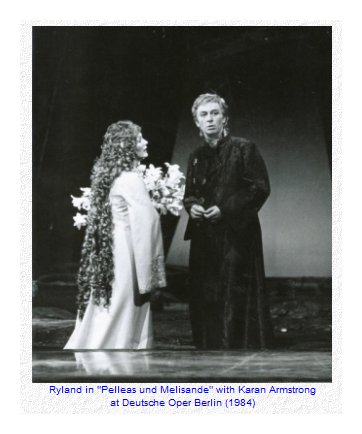 BD: It must be a
very high baritone?
BD: It must be a
very high baritone?
Ryland: It
must be a very high baritone. Someone
like Dwayne Croft who’s done it very successfully recently at
the Met, or Thomas
Allen, who is
well documented as having sung it — not that his
voice is the heaviest baritone, but it is quite lusty, and he has the
height. When I came to do it, I was very
fortunate to be in a Götz Friederich production in Stuttgart and
later Berlin. I had two conductors. First, Silvio Varviso
realized they wanted a tenor voice because
they wanted a slightly lighter Golaud voice, so it worked out very
well. Varviso got the orchestra to mark down if it were too
forte. Debussy has
written double or treble
forte on a certain chord where
I had to sing a low D. I’ve got a ring down there in my
voice and it works, by jingo. There were a lot of those low
passages. I remember him saying, “Now
please make one
forte for those four bars and
then come up a bit more.” And I was so
fortunate later with Jesús
López-Cobos in Berlin with the
same production. He had worked it with Janine Reiss in
Paris,
and
got a lot from her about the piece and the style. But he also
realized it’s a tenor Pelléas they’re using. He can’t dig
down there! He can’t beef it up down there! He can only
speak down there, as clear as possible. So he marked down.
It didn’t rob the audience and the orchestra of any of
their enjoyment.
BD: They have
to get out of your way so that you can
perform.
Ryland: This
is it! It’s a question catering to the
horses you’re using.
BD: Nicolai
Gedda had a good success with
Pelléas, also. He sang it in New York in the 1960s.
Ryland: I
didn’t know that, Bruce! Wow, he’s one of my idols, I must
say. I’ve not met him more than twice, but I feel
I’ve gotten to know him because I’ve been listening to
recordings. I grew up at Manchester with many
records, one being ‘Gedda à Paris’, singing French
repertoire. That’s a lesson for any young tenor on the
style and the way to sing that stuff.
BD: Is it
good for a young tenor to listen to
the more mature tenors, to learn the style?
Ryland: To
have an indication, yes, it’s almost
unavoidable. However young you are, if you hear a beautiful voice
on the radio or in a friend’s apartment, the next thing you want to
know is who’s that and where can I buy the record — especially
if it’s impressed or touched you.
BD: But I
assume that you have to be very selective of whom you listen?
Ryland: You
have to be very careful of whom you listen,
and then you have to be prepared to be humble because you
can’t probably sing half the notes, or even get some of the notes that
Nicolai would sing. In Benvenuto
Cellini, for example, he sang pianissimo B-flats like nobody
I’ve ever heard
before or since, except perhaps the young Di Stefano. Gedda’s
voice was so poised and consistent in those
affects that he did so well.
BD: And then
he goes and sings something like
Arnold with all those high Cs and a couple of C-sharps!
Ryland: God
yes, and all that!
BD: Some
youngsters might think to themselves, or be told by others, “You’re
a
tenor! Why can’t you do that?”
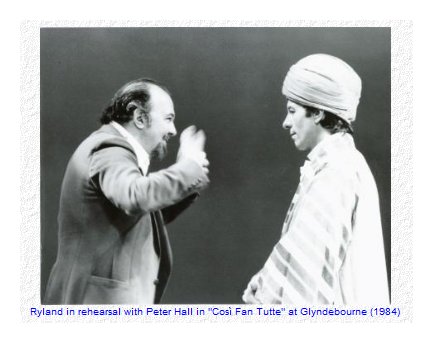 Ryland: Well, you
see, God had other plans for me! I
got into the business at twenty-one by having done one stint of four
months of the Festival Chorus at Glyndebourne. I sang to Bryan
Balkwill,
who was guest conducting Flute
that summer. He held auditions amongst
the chorus to hear what the talent was like. He was Musical
Director of the Welsh Opera that time. He remembered me
because I sang an aria from The
Barber of Seville. They needed an Almaviva
because the guy was not well, or he pulled out, or something six weeks
before opening night.
Ryland: Well, you
see, God had other plans for me! I
got into the business at twenty-one by having done one stint of four
months of the Festival Chorus at Glyndebourne. I sang to Bryan
Balkwill,
who was guest conducting Flute
that summer. He held auditions amongst
the chorus to hear what the talent was like. He was Musical
Director of the Welsh Opera that time. He remembered me
because I sang an aria from The
Barber of Seville. They needed an Almaviva
because the guy was not well, or he pulled out, or something six weeks
before opening night.
BD: Did you
know the whole role or just the aria?
Ryland:
Fortunately I had sung it at eighteen
years of age at Manchester, with, I
may say, good success. One critic said I already had the voice of
a much more mature performer, and didn’t push myself. Of course,
that’s all confidence building, and the
only thing I had to do was to learn a somewhat different English
translation and keep calm! [Both laugh] I was out
of college in April, having the summer term of college off to go and
take experience with being part of the Glyndebourne Chorus, and I never
went back. I did three and a half years. I should have done
four or perhaps an extra, and many times I wished I’d done an extra
year, but this launched me very quickly. I
won some scholarships and went to Italy and studied with Ettore
Campogalliani, then with Luigi Ricci in Rome. In no time
at all, those Barbers led to
Fentons at Scottish Opera in 1966, and my first
Ferrando with Dame
Janet Baker as Dorabella and Elizabeth Harwood in 1967, and Belmonte
at Glyndebourne in 1968. So I was quickly into my Mozart after
barely three
years. Mozart’s writing for the tenor — at
least in my experience with both of
those Da Pontes, the Entführung
and Zauberflöte
— is that they hardly ever go above a B-flat. In fact
I don’t know if they
ever do, and very often it’s only an A natural. Tamino never
goes above an A. Mind you, there’s quite a lot of them, and
Ferrando certainly has many A naturals to
sing. I had been singing Ferrando for many years, but in Sir
Peter Hall’s production at Glyndebourne I suddenly had to
sing ‘Ah! Lo veggio quell’anima
bella’, which I had only
ever recorded with Solti
on the first recording he made of Così
in ’73. That’s interesting because I had no old habits with
it, and
it was one of the best arias of the three! You still want to be
at home with the ones
you’ve been doing, by that point, after twenty years it was nice to add
something new. But what I’m coming to is that
for the height, you need some of those high Donizetti things and higher
Rossini or
some Puccini, like Bohème.
I’d never had to extend
myself much above B-flat except in other operas occasionally.
There are one or two B naturals for Fenton, and then as Cassio
in the great ensemble in Act three where everybody’s singing, there’s a
C-flat, in other words, B natural. I did a film with Kiri, when
she
was very young, when she’d really broken through. They
made a documentary and we did Act One of Bohème from the knock on the
door.
BD:
Just the scene?
Ryland: Just
the scene, yes. I got my underpants
twisted enough to manage that. [Both have a huge laugh]
BD: But I
would think it would almost be the best to let you do a little bit in
order to convince you that
you’d better never do the whole thing.
Ryland:
Yes. My teacher said to me — and I agreed
with him as I got older and listened to him more, and talked to more
colleagues who I appreciated and trusted — I
would be all right, but in that wonderful duet in Act Three with those
B-flats, if I
had a fatter-voiced soprano I would be tempted
to match her and I might do myself some mischief. He was not a
man to be over-careful, because over-careful
means you never develop the voice at all. It’s just a question of
juggling and trying to be
honest. As I look back now on the career of
Alfredo Kraus, for
example, or Tito Schipa, I think they dabbled in a
lot of things earlier on, but in their main ‘known for’
repertoire. I’ve
never seen Alfredo listed for big Puccini roles.
BD: He
recorded Bohème but
that was just in the studio as far as I know.
Ryland: I’m
sure he could sing the notes as well as
anybody alive.
BD: But he
sang Werther here twice!
Ryland: Yes,
yes. You see, that’s
French verismo. There’s something different. It’s like
Puccini but it’s not.
BD: Each
voice must really think of about each
role individually. It’s really not just a fach.
Ryland: No
it’s not, and that brings you back to
those old singers in the pre-20s. Those
sopranos might have been singing Mimì one night and Despina some
other night! Think of Plácido. He’s running out
of repertoire! Somebody told me he’s been recording the
odd baritone thing here and there, which would be no problem for
him.
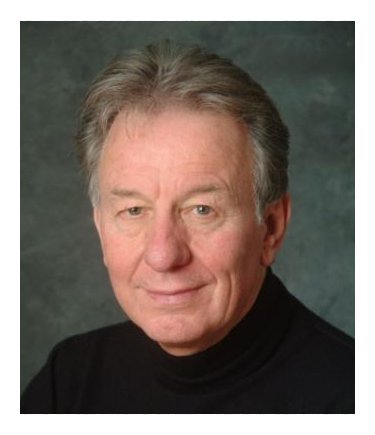 BD: I remember more
than twenty years ago when he was doing his
early Otellos, they said he would ruin his
voice.
BD: I remember more
than twenty years ago when he was doing his
early Otellos, they said he would ruin his
voice.
Ryland: There
is an example of someone who did it with honesty and with his own
voice. I have had the honor of doing it with him a few times, and
what thrilled me was he asked for me. This was in Madrid with
Cappuccilli, Ricciarelli and
myself and others. He’d been doing it in Hamburg a little before,
so they weren’t his very first ones, but they must have been,
maybe, his fifteenth performance, and it was marvelous! That was
in the mid-70s. Years later, in 1983, he saved Opening Night in
San Francisco when dear Carlo
Cossutta canceled at 11 o’clock in the morning. It was Margaret
Price, Silvano Carolli, and Marek Janowski in
the pit, and myself as
Cassio. Mr. McEwen [Manager of
the San Francisco Opera]
phoned us all up at 11:45 am and told us the situation. A
benefactor had put forward
$14,000, and allowed Plácido
to get a private jet. He’d just arrived to rehearse Trojans at
the Met, but he jumped on the plane. The audience was spoken to
at five to seven by Mr.
McEwen. A gasp went round that the
tenor had canceled, and then a cheer went up when they heard who was
going to replace him. [Both laugh] They were told to please
go for
dinner and come back around 9:30 pm. They did that.
Plácido arrived at
San Francisco at around a quarter to nine, and got into the theater
twenty-five minutes or so later. He’d done
the Ponnelle production earlier, but he just asked for a
black coffee and an apple. I heard a few scales in the room next
to me,
and that was it! At 10:28 pm the curtain went up, and he
was glorious. The point I’m coming to is it had been ten years
since
I’ve heard him, and the voice was still that bright, brazen, beautiful
Domingo
sound we all know. The low
middle and the bottom had taken on, to my ear, a natural darker hue,
but it didn’t
seem mannered and put on like ‘I must sound more dramatic than I
did’. No, it had come through the work.
BD: So it was
there and he then
decided to use it?
Ryland:
Yes. He probably had it before but it was just progressing.
It was coming out of him through
familiarity with the character and the role and sincerity. He was
not
trying to be Del Monaco or Tamagno or some other
guy, but just being Domingo — intense and
sincere, and I think that’s why
he’s lasted.
BD: It must
give him a sense of satisfaction to know
that just being Domingo is good enough.
Ryland:
Absolutely!
BD: It must
give you a sense of satisfaction
to know that being Ryland Davies is plenty good also.
Ryland: Well,
thank you very much, Bruce. During my first five years at
Covent Garden, they liked me, but critics and people had the right to
say, “Lovely voice, sweet voice, but a bit light
just now for the house. Maybe he’ll grow into it.”
That went on, as with many
I’m sure in their early years, and eventually of course I got used to
the house and those comments stopped. It was ’84 or ’85 when I
stopped singing those roles
and went into teaching full-time. But I was drawn back by events
which led to me now going into the character repertoire, and people
have been commenting on how much freshness and ring
there is in the voice. This summer at Glyndebourne I met Paolo
Montarsolo. It was the first time we’d seen each other for I
don’t know how many years. We did my first Italian Così at Glyndebourne in ’69,
and his comment was, “How fresh it
is yet again!” But after so many years,
all I can
say, in my own
humble way, is that I know it’s true because the sound of my voice to
me has hardly altered. It’s just got a little richer.
There’s more depth and there’s more punch in the sound and this thing
called ‘presence’ and ‘projection’. It’s the
projection-thing which we all hope we learn as soon as possible.
Some people have such big voices. Bryn Terfel for example, has a
wonderful projection for a man so young,
and he probably had it ten years ago when he was still studying.
BD: You sang
so much in Glyndebourne, which is
such a very small house and now you sing all over the world in the big
houses such as Chicago. Do you change your technique at
all for the size of the house?
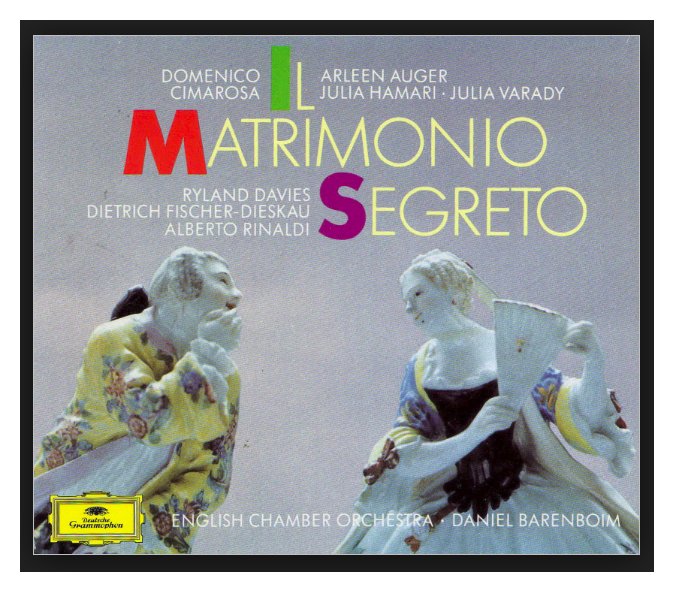 Ryland: Bruce,
that’s a very valid point you’ve brought up. When my teacher came
and heard me sing Ferrando in 1969 at
Glyndebourne, he was pleased with my style and my beauty of tone, but
wasn’t exactly pleased with the kind of projection I was using there
— which we’d been encouraged to do because of the smallness
of the
house. Maestro Strasser had us singing pianissimi, which were
beautiful and ravishing and perhaps correct for the listeners.
But my teacher, who had been brought up listening to singers in
La Scala, Milan for those nine years before the War, wasn’t someone who
wanted shouting and bawling. On the contrary, all
he wanted was beautiful singing. But he realized that I, at
times, was a
little dangerously too under-singing because the house would take
it. One was almost achieving some piani by being quasi-off the
voice, somewhere between mixed and
falsetto. It’s better to be one or the other, because
usually mixed voice, if it’s done properly, is
on the body. In other words, it’s supported. I didn’t cheat
a falsetto
in those performances, but for him I
hadn’t progressed enough, and that was five years after I left
college. I left at twenty-one, and I must confess that I
was so off the mark with my career that I barely saw him in the first
four years. I wasn’t singing badly, but I realize
now — it’s always in retrospect that we realize
as life goes on — that
I’d perhaps been so young that I could have done with another year or
two around his apron strings until I was about twenty-three.
Ryland: Bruce,
that’s a very valid point you’ve brought up. When my teacher came
and heard me sing Ferrando in 1969 at
Glyndebourne, he was pleased with my style and my beauty of tone, but
wasn’t exactly pleased with the kind of projection I was using there
— which we’d been encouraged to do because of the smallness
of the
house. Maestro Strasser had us singing pianissimi, which were
beautiful and ravishing and perhaps correct for the listeners.
But my teacher, who had been brought up listening to singers in
La Scala, Milan for those nine years before the War, wasn’t someone who
wanted shouting and bawling. On the contrary, all
he wanted was beautiful singing. But he realized that I, at
times, was a
little dangerously too under-singing because the house would take
it. One was almost achieving some piani by being quasi-off the
voice, somewhere between mixed and
falsetto. It’s better to be one or the other, because
usually mixed voice, if it’s done properly, is
on the body. In other words, it’s supported. I didn’t cheat
a falsetto
in those performances, but for him I
hadn’t progressed enough, and that was five years after I left
college. I left at twenty-one, and I must confess that I
was so off the mark with my career that I barely saw him in the first
four years. I wasn’t singing badly, but I realize
now — it’s always in retrospect that we realize
as life goes on — that
I’d perhaps been so young that I could have done with another year or
two around his apron strings until I was about twenty-three.
BD: I wonder
how that would have affected your career?
Ryland: I
might have missed the gap. As my grandmother said, “God
has a plan for every man and
woman.” I’ve had
this conversation with colleagues who study with me, and who didn’t go
on because for one reason or another. In one gentleman’s case, it
was the
quality of voice, and he said to me, “Ryland,
you’ve been teaching now privately for about twelve
years. If you hadn’t started so soon and had the experience and
trials and challenges of your life, you’d have less to give now in your
teaching career.” I starting
teaching at forty-eight, which is a bit soon, but he said, “You
started singing at
twenty-one. Think what you’ve done already!”
BD: So each
to his own
individually.
Ryland:
Exactly. Look at Ileana
Cotrubaş. She decided a few years ago that she was done after
twenty-five years on a very high level. Janet Baker pulled
the plug on opera and went back to her concerts, and recently bowed
out like that. I admire that for people
who are able to, and let’s be honest, if
you can afford to do it!
BD: Speaking
of
teaching, are you pleased with the sounds you hear coming out of
the young throats?
Ryland: Yes,
generally speaking. Talking of Domingo a minute ago and people
like Mirella, you don’t necessarily hear somebody like that every
day. There are high-standard competitions, and some
of those who enter are quite matured and have already had a few seasons
in
the business, I gather. In
Wales there is this thing called the Cardiff Singer of the World.
I’ve not been involved in it
yet myself, but I’ve certainly taken notice of it. I
go as an adjudicator, or a master class giver, and I think what you’re
talking about is
young singers on the threshold, who are coming out of a college,
perhaps, and ready to audition for a program like here in
Chicago. I was very impressed with the basic standard of the few
people I
heard here last week. One or two of them are in the Figaro with
us, and that’s encouraging. If I may speak of one, my
dear colleague Jerold
Siena, who sings Curzio, carves me up every night. He was so
sweet
when he
said that I really sing this role. That makes me happy. He
also told
me he is understudying me in the role, and I didn’t know
that. I’m going to Santa Fe this summer for the first
time, and I’ve
offered my services to Richard Gaddes and Mr. Crosby for the young
people there. [Gaddes
was consultant to the Santa Fe
Apprentice Program at that time, and later succeeded John Crosby as
General Director.] They apparently have a very
high standard of apprentices. So I’m looking forward to what’s
coming out of those throats. There’s
a lot of promising material around, but to be quite honest with you, in
the last couple of years I have been so busy in my own singing that I
haven’t had time to go and work at some of the colleges in England as
much as I had two years before. It goes like that sometimes.
BD: I’m sure
you want your own
career to progress as much as it can?
Ryland: Yes.
BD: Do you
like these character roles that you’re doing now?
Ryland: It’s
been a wonderful
chance for me to have complete fun and new challenges. I’ve
played ‘lover boys’ for twenty-six years or thereabouts, and with no
disrespects to them, the music has been a joy. I’ve enjoyed
it. I’ve been so fortunate but they’re much of a mushiness.
You’re in love with a woman, you’re going to lose her or you’re going
to win her, or you’re going to find her, or she’s going to run off with
somebody else... or you get killed as poor Lensky does. With
these character guys, like Le Duc in Chérubin,
I may be a little rude and say what a
fussy-arsed little chap he was, bossing everybody
about. That was my first work with Susan Graham, who is a
fantastic colleague. She had an enormous success with
it. But it was funny. He’s antagonistic towards
her because Chérubin — Cherubino in a
later story by
Massenet, and further adventures of Cherubino — is
outrageous, and Susan
played him wonderfully. My job was to be antagonized by all
this, so I was playing a very fussy, almost a ‘queen-type’ chap always
running him down. I was enjoying all that, because it
was quite different from being moon-eyed Belmonte singing ‘Wenn der
Freude Tränen Fließen’. Then Basilio is some
kind of slimy character who’s all smiles
but is killing you with it!
BD: He’d love
to just stick it to you?
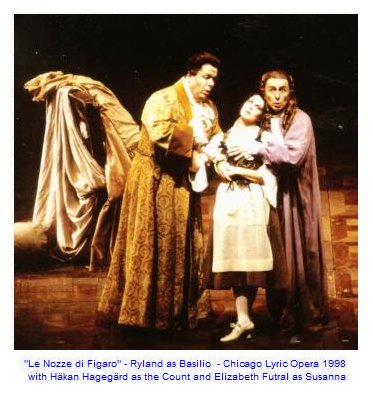 Ryland: Yes.
There are more channels or
avenues for my acting talents. Nobody yet has asked me to do
anything character-wise, or to change the timbre of my voice, which has
pleased me no end. In fact the opposite has happened. It’s
wonderful. In the
States they tell me, “It’s Deluxe Casting to get
a Mozart tenor of your
experience and quality singing some of these character roles”
Ryland: Yes.
There are more channels or
avenues for my acting talents. Nobody yet has asked me to do
anything character-wise, or to change the timbre of my voice, which has
pleased me no end. In fact the opposite has happened. It’s
wonderful. In the
States they tell me, “It’s Deluxe Casting to get
a Mozart tenor of your
experience and quality singing some of these character roles”
BD: Of course
they put the
aria back in the last act because you have a tenor who can
actually sing it, and sing it so well!
Ryland: I
thank Zubin and Stephen
Lawless, who is re-doing Sir Peter’s production. Peter always had
everything in, all the recits and everything.
He had a thing about that. I must say, with Da Ponte’s richness I
like it all in, not just for the aria. The recits are
very often chopped up. But Zubin said he feels
that with those two arias in in the fourth act it is a better balance
for the construction of the act. With out them you catapult some
of
the events for Figaro and Susanna and the Countess and the Count too
quickly by having no time for Figaro to go off. So with these
arias back in, he can do his
whistle and come back, and do all those other things. People have
been cutting them for years, but I was surprised because my agent in
London said, “Oh, you won’t get to sing your
aria in Chicago. Forget that, but you better do the job!”
But I was delighted to come. I haven’t been here for twenty-six
years. But I’m still on new ground with
Figaro. It’s only four
years since I first did it. My baptism by
fire was the recording with Sir Charles Mackerras.
BD: Until
they started putting the
aria back in, people thought there’s no tenor in Figaro. But
then it turns out that there really is!
Ryland: There
really is. He does the scene with Susanna, and the trio,
so he’s made certain points. But in a long opera, that’s
way in the middle of the first act. Then you’ve only got
ensembles if you don’t do the aria. But I must say the tessitura
in those ensembles is very testing for everybody concerned, including
the Basilio. The aria’s not that high,
actually. It only goes up to a G, though there’s quite a lot
of them. This is typical of Mozart — there’s
not much chance to stop and
have a breather or a glass of water because you just
carry on.
BD: The nice
thing
about this Figaro is every
single part is
up to the standard. It’s almost as if you don’t notice it
because everything is on this high level. You would notice it if
someone let down, but nobody lets the cast down.
Ryland: Oh,
it’s lovely to hear that.
At
this point I asked my guest to do a station-break for us, something I
requested of everyone I interviewed in person. [“Hello, this is (insert name), and you’re listening to WNIB, Classical 97 in
Chicago.”]
These would run occasionally throughout the day, and listeners seemed
to get a kick out of hearing them. After obliging, he noted that
he was fifty-five years old the previous month.
BD: Are you
at the point in your career that you
wanted to be at this age, or is it a complete surprise?
Ryland: When
I was starting out at
twenty-one, I remember my accountant advised
me about pension schemes. I said yes, because singers like myself
might have to retire by the time we’re fifty. I
really meant that because I didn’t know how the voice would last.
Because of having had such a big bite of those lovely
roles I did for twenty-six years, it was a little
bit of a wrench to swallow my pride when it was suggested that I might
move, at fifty-one years of age, into the character stuff. But
events just before that did make me question if I was I going to carry
on and try and keep up with everything. I had a little hitch in
’83 with my
repertoire and my singing, which promoted three or
four lean years. It’s that’s sort of
business. If you’re out of consistency for a moment,
there’s always the young people coming in, and the opera companies do,
and rightly so, love to bleed new talent, especially if they think they
are ready. They love to give them their chance and they love to
be seen to have discovered them. [I asked for clarification about the use of
the term ‘bleed’ and
suggested the Americanized word might be ‘squeeze’, and he said that was exactly
correct!] As I said
earlier, those young singers must know themselves, and have the
strength to say
‘excuse me’. I had to tell that management at Sadler’s
Wells I was not ready to be on the roster of their company. I did
not say exactly what I wanted to say... I had to be tactful not to say
it
was
because I know you’ll ask me to do too much too soon, even of the
right things. It’s very tough to say no. I’ve made at
least three or four mistakes in my life, but...
BD: I’m sure
if you had sung a few Bohèmes
and a few Werthers, they’d
have offered you Lohengrin!
Ryland:
Especially if they had been a success, yes. If I may be
honest about going into this character rep now, some of the roles I
will do have got tricky things and corners and awkward phrases.
This is
like my big rep before, but generally speaking the pressure’s reduced
for me, and more relaxed.
BD: But
combining this with your teaching I
would have think this will be almost ideal. You can go and
sing the Basilio in the Figaro,
and give some master classes to steer some people in the right
directions.
Ryland:
You’re so on the button. What I have enjoyed for these last
twelve years is my private teaching and my master class giving,
directing kids in that school in opera scenes, and producing
operas. I would not have the energy to do it otherwise. I
would have
to protect myself more. Within reason, Basilio aria in or
out, I have enough energy because that doesn’t kill me off
too much to go and do three hours the day after with some students if
they want me. Whereas if I’d sung Nemorino, which is not as long
as Susanna but it’s a long role, I probably wouldn’t feel so good about
doing that
during the two days in between the next performance of L’Elisir. One
has to be realistic that way. It’s a nice mix. I’m at the
right age, I think, to give something back to the
profession and my coming colleagues, and by doing this
repertoire I will have energy in reserve, please God.
BD: Thank you
for everything you have given and
continue to give to the opera world.
Ryland: Thank
you very much.
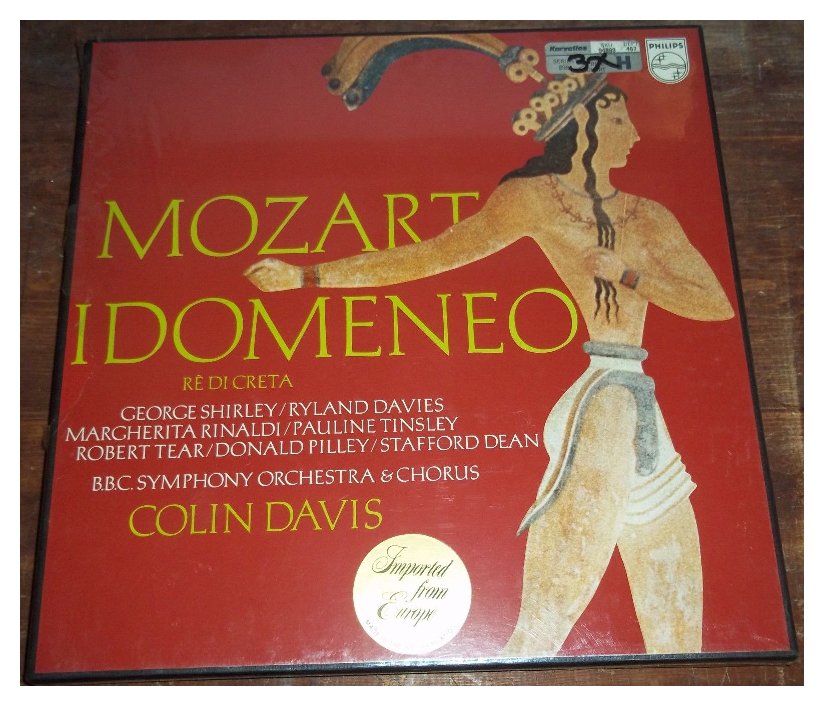
To read my Interview with George Shirley, click HERE.
To read my Interview with Stafford Dean, click HERE.

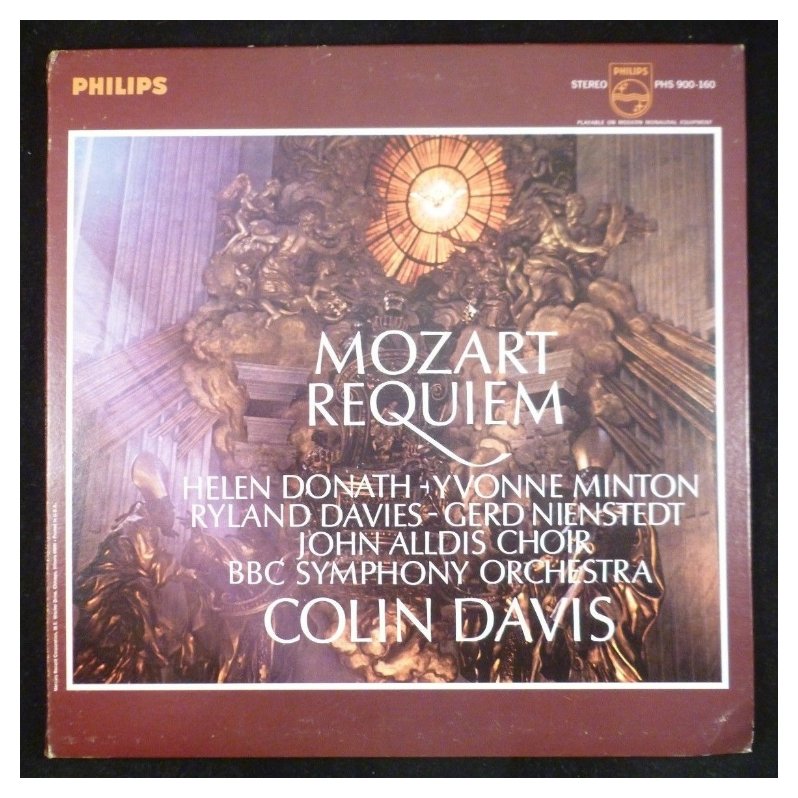
To read my Interview with Helen Donath, click HERE.
To read my Interviews with Yvonne Minton, click HERE.

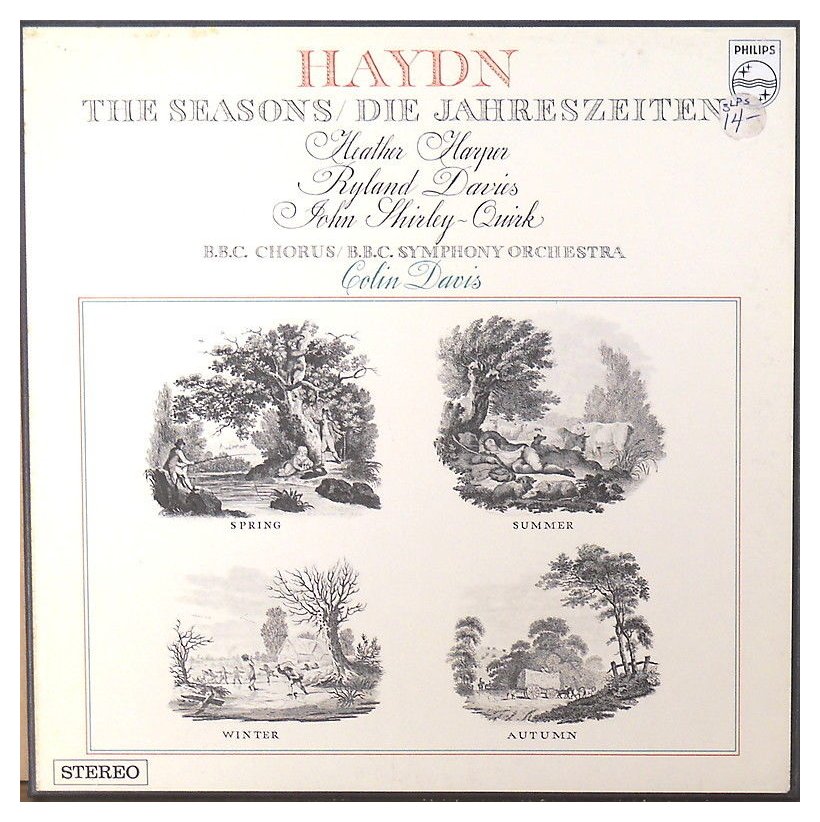
To read my Interview with John Shirley-Quirk, click HERE.
|
© 1998 Bruce Duffie
This conversation was recorded in the office suite of Lyric
Opera of Chicago on March 5, 1998. Portions were broadcast on
WNIB the following
year. This transcription was made in 2014, and posted on this
website
at that time. My thanks to British soprano Una
Barry for her help in preparing this website
presentation.
To see a full list (with links) of interviews which have been
transcribed and posted on this website, click here.
Award
- winning
broadcaster
Bruce Duffie was with WNIB, Classical 97 in Chicago from 1975
until
its final moment as a classical station in February of 2001. His
interviews have also appeared in various magazines and journals since
1980,
and he now continues his broadcast series on WNUR-FM, as well
as
on Contemporary Classical Internet Radio.
You are invited to visit his website
for more information about his work, including selected transcripts of
other interviews, plus a full list of his guests. He would also
like
to call your attention to the photos and information about his
grandfather, who was a pioneer in the automotive field more than a
century ago. You may also send him E-Mail
with comments, questions and suggestions.


 Ryland Davies: Tell
me the secret of singing
anything! Singing Mozart? The secret is the technique for
the singer must be pretty well set up because he’s the most exposing of
composers. It looks so simple on the page, as singers will tell
you, but that simplicity demands a purity of line and a very poised
technique. I don’t mind going on record as saying that. My
teacher, Frederick R. Cox, was somewhat criticized in Manchester, back
in the 50s, 60s and
70s when he was the Principal for not doing hardly any Mozart!
His belief was that it was for more matured and poised technique.
We were given Mozart arias to sing for concerts and things like that,
but he felt to sustain a major
Mozart role, unless they were
particularly gifted and the technique was really advanced, that it
would inhibit students. I never heard him say this, but I
gathered
this over the years. It could inhibit because it demands
such control.
Ryland Davies: Tell
me the secret of singing
anything! Singing Mozart? The secret is the technique for
the singer must be pretty well set up because he’s the most exposing of
composers. It looks so simple on the page, as singers will tell
you, but that simplicity demands a purity of line and a very poised
technique. I don’t mind going on record as saying that. My
teacher, Frederick R. Cox, was somewhat criticized in Manchester, back
in the 50s, 60s and
70s when he was the Principal for not doing hardly any Mozart!
His belief was that it was for more matured and poised technique.
We were given Mozart arias to sing for concerts and things like that,
but he felt to sustain a major
Mozart role, unless they were
particularly gifted and the technique was really advanced, that it
would inhibit students. I never heard him say this, but I
gathered
this over the years. It could inhibit because it demands
such control. BD: It must be a
very high baritone?
BD: It must be a
very high baritone? Ryland: Well, you
see, God had other plans for me! I
got into the business at twenty-one by having done one stint of four
months of the Festival Chorus at Glyndebourne. I sang to Bryan
Balkwill,
who was guest conducting Flute
that summer. He held auditions amongst
the chorus to hear what the talent was like. He was Musical
Director of the Welsh Opera that time. He remembered me
because I sang an aria from The
Barber of Seville. They needed an Almaviva
because the guy was not well, or he pulled out, or something six weeks
before opening night.
Ryland: Well, you
see, God had other plans for me! I
got into the business at twenty-one by having done one stint of four
months of the Festival Chorus at Glyndebourne. I sang to Bryan
Balkwill,
who was guest conducting Flute
that summer. He held auditions amongst
the chorus to hear what the talent was like. He was Musical
Director of the Welsh Opera that time. He remembered me
because I sang an aria from The
Barber of Seville. They needed an Almaviva
because the guy was not well, or he pulled out, or something six weeks
before opening night. BD: I remember more
than twenty years ago when he was doing his
early Otellos, they said he would ruin his
voice.
BD: I remember more
than twenty years ago when he was doing his
early Otellos, they said he would ruin his
voice.  Ryland: Bruce,
that’s a very valid point you’ve brought up. When my teacher came
and heard me sing Ferrando in 1969 at
Glyndebourne, he was pleased with my style and my beauty of tone, but
wasn’t exactly pleased with the kind of projection I was using there
— which we’d been encouraged to do because of the smallness
of the
house. Maestro Strasser had us singing pianissimi, which were
beautiful and ravishing and perhaps correct for the listeners.
But my teacher, who had been brought up listening to singers in
La Scala, Milan for those nine years before the War, wasn’t someone who
wanted shouting and bawling. On the contrary, all
he wanted was beautiful singing. But he realized that I, at
times, was a
little dangerously too under-singing because the house would take
it. One was almost achieving some piani by being quasi-off the
voice, somewhere between mixed and
falsetto. It’s better to be one or the other, because
usually mixed voice, if it’s done properly, is
on the body. In other words, it’s supported. I didn’t cheat
a falsetto
in those performances, but for him I
hadn’t progressed enough, and that was five years after I left
college. I left at twenty-one, and I must confess that I
was so off the mark with my career that I barely saw him in the first
four years. I wasn’t singing badly, but I realize
now — it’s always in retrospect that we realize
as life goes on — that
I’d perhaps been so young that I could have done with another year or
two around his apron strings until I was about twenty-three.
Ryland: Bruce,
that’s a very valid point you’ve brought up. When my teacher came
and heard me sing Ferrando in 1969 at
Glyndebourne, he was pleased with my style and my beauty of tone, but
wasn’t exactly pleased with the kind of projection I was using there
— which we’d been encouraged to do because of the smallness
of the
house. Maestro Strasser had us singing pianissimi, which were
beautiful and ravishing and perhaps correct for the listeners.
But my teacher, who had been brought up listening to singers in
La Scala, Milan for those nine years before the War, wasn’t someone who
wanted shouting and bawling. On the contrary, all
he wanted was beautiful singing. But he realized that I, at
times, was a
little dangerously too under-singing because the house would take
it. One was almost achieving some piani by being quasi-off the
voice, somewhere between mixed and
falsetto. It’s better to be one or the other, because
usually mixed voice, if it’s done properly, is
on the body. In other words, it’s supported. I didn’t cheat
a falsetto
in those performances, but for him I
hadn’t progressed enough, and that was five years after I left
college. I left at twenty-one, and I must confess that I
was so off the mark with my career that I barely saw him in the first
four years. I wasn’t singing badly, but I realize
now — it’s always in retrospect that we realize
as life goes on — that
I’d perhaps been so young that I could have done with another year or
two around his apron strings until I was about twenty-three. Ryland: Yes.
There are more channels or
avenues for my acting talents. Nobody yet has asked me to do
anything character-wise, or to change the timbre of my voice, which has
pleased me no end. In fact the opposite has happened. It’s
wonderful. In the
States they tell me, “It’s Deluxe Casting to get
a Mozart tenor of your
experience and quality singing some of these character roles”
Ryland: Yes.
There are more channels or
avenues for my acting talents. Nobody yet has asked me to do
anything character-wise, or to change the timbre of my voice, which has
pleased me no end. In fact the opposite has happened. It’s
wonderful. In the
States they tell me, “It’s Deluxe Casting to get
a Mozart tenor of your
experience and quality singing some of these character roles”